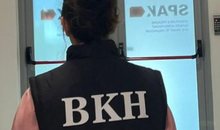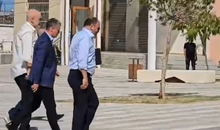
 Flash News
Flash News

After working for years as an immigrant in Greece, Bari Kika, 63, returned to his homeland and decided to invest in a small farm and breed goats. After four years, the herd of goats numbers 270 heads, but Kika, like many other farmers in the area, has difficulty providing the food base for the sheep as the weather here is harsh. He receives a subsidy from the government equal to 1,200 lek per head of cattle, but complains that this amount is too small to cover expenses.
"I need to build a stable, but it's out of the question," said Kika, while adding that she leaves the goats' milk to the kids as it is sold at a very low price. "I work only with my son, whom I have forbidden to emigrate," he explained.
Support funds for agriculture in Albania are allocated by the Agricultural and Rural Development Agency (AZHBR), but farmers complain that it is not easy for them to access this money, because they face bureaucracy during the drafting and completion of the required documentation.
More than 30,000 farmers and livestock breeders work in the district of Dibra, but the Regional Agency for the Extension of Agriculture Dibra (AREBD) states that only 6 percent of them have benefited from financial support from the funds for agriculture during 2023.
According to the National Institute of Statistics, INSTAT, in Dibër district in 2023, about 47 thousand hectares were planted with various agricultural crops, including fodder, cereals, wheat, corn, vegetables, barley, rye, beans, medicinal plants and potatoes.
Most are small farmers, because they operate in rural areas with parcelized lands and find it difficult to meet the conditions, criteria and norms to benefit from subsidies from the government or EU funds.
The vast majority of farmers in Dibar are not subsidized as they do not meet the appropriate requirements to benefit from the financing, which they often perceive as deliberate barriers.
"Our funds, I suspect, are appropriated by abusive persons, who are not related to any field of agriculture", said a farmer, at the same time a specialist in the field of agriculture, who asked to remain anonymous.
He said that in the area where he works, none of the farmers managed to receive funds from large financing programs such as IPARD.
"These funds do not come to us, but to "chosen" persons", emphasized the specialist.
He recalled that he spent 150,000 lek to fill out the documents for an application that would help him cover the vineyard with a net to protect it from hail, but he did not win it, nor did he learn why his request was rejected.
Xhaferr Leti, a farmer and beekeeper from Dibra, said that the only aid he receives from the state is a payment of 1,000 lek per beehive, but that according to him is very little compared to countries in the region like Kosovo, where for each beehive you are financed with 30 euros.
"Even in Kosovo, you are financed with machinery for extracting honey, modern beehives", Leti explained.
He complained that Albanian beekeepers are unprotected from damages that can be caused due to the weather or diseases.
"I have 250 beehives and I want to double them, but there is a lack of funding from the government," said Leti. "I don't lack experience to develop this business, as my family has been raising and breeding bees since 1938," he added.
Leti hoped to secure support from European Union funds, through the IPARD Pre-Accession Assistance Instrument, although he was aware that the process was complicated.
"We have to tell the truth, that it is very difficult, if not impossible, to benefit from these funds," he said.
But before Leti applied, the IPARD III program funds were blocked, after the European Union's Anti-Fraud Office, OLAF, announced that it had identified the misuse of 33 million euros by the Albanian authorities.
The scandal was discovered after some of the Albanian citizens who applied for funds denounced the Albanian office for corrupt practices. According to the clarification by OLAF, their investigation revealed that the applicants were required to pay a high percentage of the grant to "pre-selected" consulting companies that facilitated the realization of the contracts with AZHBR.
Some farmers in Dibër complain that not only do they not have access to funds, but also to information about their existence.
"I am not aware that anyone has introduced us to this program", said Sali Bici, who has invested in fruit growing.
However, Blerim Dibra, director of AREB Dibër, told BIRN that the work for the proper orientation of farmers and information sessions to apply for AZHBR funds has not been lacking.
"In every municipality, they have been organized continuously and coherently, especially by the offices of the AZHBR, as well as by the Agropoints, which distribute the appropriate information on how to apply", he emphasized./ BIRN
Latest news



What does Zelenskyy have more than Zegjineja?
2025-07-05 18:45:26

Fiscal peace, but at a cost
2025-07-05 18:00:10
'Bankers' tax evasion, Chinese CEO and former director jailed
2025-07-05 17:39:21
Kyle Walker joins English club on two-year deal
2025-07-05 17:20:24
Two cars collide on the Saranda-Delvina axis, 4 injured
2025-07-05 17:05:29
Touching gesture! Liverpool will pay Jota's family's salary until 2027
2025-07-05 16:45:18
The zodiac signs that cheat most often
2025-07-05 16:25:53

"I asked for the dismissals", Dredha tries to soften Rama's 'blow' in Vlora
2025-07-05 15:48:49
Bomb threat in Parliament, prosecutor: It was a lie
2025-07-05 15:22:28

Bardhi: The recount revealed how greedy Zeqine Balluku is in stealing
2025-07-05 14:44:29
Knife wound on the secondary road Tirana-Durrës, perpetrator sought
2025-07-05 14:37:54
Tears and pain, Diogo Jota is escorted to his final home
2025-07-05 14:21:34
Success starts with yourself! Simple ways to invest in personal development
2025-07-05 13:58:50
Unlicensed firearms found in apartment, 50-year-old arrested in Lushnje
2025-07-05 13:43:11

Tirana Court remands Skerdi Sina to prison
2025-07-05 12:59:34
Cocaine laboratory in Greece, here are the Albanians arrested and wanted
2025-07-05 12:40:16
Directed Justice/Vangjeli: SPAK does not investigate any scandal involving Rama
2025-07-05 12:22:03

Bomb alert, Police remove MPs and media from Kosovo Parliament building
2025-07-05 11:48:16
"The will of the people" and the irony of ordered resignations
2025-07-05 11:32:05
Summer drowning risk: How to enjoy the water without risking your life
2025-07-05 11:20:27
Fire situation in the country, 16 fires reported in 24 hours, 4 still active
2025-07-05 11:07:04
Car hits pedestrian at white lines, injured in serious condition in Vlora
2025-07-05 10:59:58
Mosquito-borne diseases are a growing problem in Europe
2025-07-05 10:44:13



One of Sweden's most dangerous and wanted criminals arrested in Turkey
2025-07-05 09:38:29
Foreign exchange/ How much foreign currencies are bought and sold today
2025-07-05 09:18:38

"Don't be influenced by the opinions of others", today's horoscope
2025-07-05 08:40:50

Morning Post/ In 2 lines: What mattered yesterday in Albania
2025-07-05 08:02:07

Trump says he's ready to raise tariffs to 70% on some countries
2025-07-04 22:35:52
Tre shenjat e zodiakut që do ‘pasurohen’ në Korrik
2025-07-04 22:05:09
Gaza War: Hamas Accepts US Proposal for 60-Day Ceasefire
2025-07-04 21:50:10
Autocracy in Albania, Fuga: Governance has gotten out of control
2025-07-04 21:40:51
Meta: Agriculture on credit, the new fraud!
2025-07-04 21:26:39




Vote recount in Durrës ends without changes
2025-07-04 20:12:54
Gas station explodes in Rome, 25 injured (VIDEO)
2025-07-04 20:00:20

These afternoon habits often sabotage weight loss
2025-07-04 19:39:28
Former Arsenal player Thomas Partey accused of rape
2025-07-04 19:24:21
Shepherd disappears without a trace in Delvina
2025-07-04 19:14:31

Bardho gave Zegjine's mandate/Braho: Unfair! It violates the electoral system
2025-07-04 19:01:08


Rapid developments in the Sultanates!
2025-07-04 18:00:06



Italy tightens rules for skateboard traffic
2025-07-04 17:20:18

Unusual for the time, dense fog covers the coast of Vlora
2025-07-04 16:48:01


Accident on the Shkodra-Lezhë axis, one dead and 3 injured
2025-07-04 16:14:19
Albania with fewer requests for asylum and Albanian citizenship in 2024
2025-07-04 16:06:57

Albania last for quality of life, DP: Technical government is the solution!
2025-07-04 15:42:30
Nico Williams says "No" to Barcelona, signs with Athletic Club until 2035
2025-07-04 15:33:35
Fires in the country, four fires are still active, what is the situation?
2025-07-04 15:24:20

Summer brings big changes for these 4 zodiac signs
2025-07-04 15:00:04
Osmani: MPs need to agree to a secret ballot for the Speaker of Parliament
2025-07-04 14:51:09
Serious accident on the Peqin-Elbasan axis, two injured
2025-07-04 14:37:56

GJKKO leaves in force the security measure for the head of the KPP
2025-07-04 13:58:17
Who will replace Ilir Meta and take over the leadership of the PL?
2025-07-04 13:50:36
Berisha: Dismissal of directors in Vlora, another act of 'scapegoats'
2025-07-04 13:41:46




Librazhd/ In a serious psychological state, the young man consumes pesticides
2025-07-04 13:05:07


Weapons trafficked from Kosovo to Albania, two arrested, 8 pistols seized
2025-07-04 12:33:28
Konsumimi i tepërt i çokollatës, ja cilat janë dëmet që shkakton në organizëm
2025-07-04 12:23:35

Fires in the country, 21 fires in the last 24 hours, 4 still active
2025-07-04 12:00:19
WB calls for debt transparency: Albania to publish details of every loan
2025-07-04 11:50:05
Changes in the State Police, new names expected to lead 5 police stations
2025-07-04 11:40:06

The race for the head of the BKH, the third phase on July 11
2025-07-04 11:20:23

Toxic phrases that show your relationship is in trouble
2025-07-04 11:00:10
